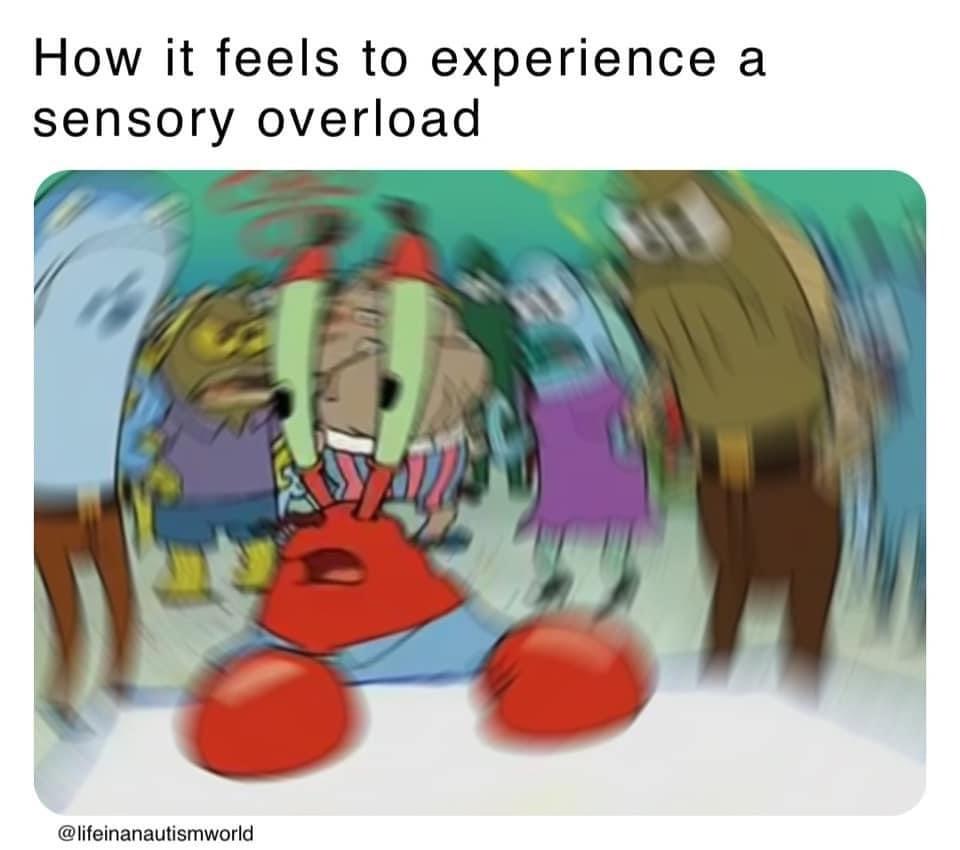
What sensory overload feels like
I suffer from sensory mixing and sensory overload. I have no internal editors or filters, meaning that everything in my immediate environment is present to me at once.
You deal with it by having a ritual and a routine, surrounding yourself with familiar landmarks and stabilisers. But often in life, venturing into the world of others, you enter the arena unarmed. People often think that you are slow. The truth is that you are processing far more information than they are in the same amount of time. That’s because you can’t screen out irrelevant information the same way that those others do, leaving you having to weigh and evaluate everything that comes to the senses. That is nothing less than exhausting. The flow can tend to become a flood that is no longer possible to hold at bay. That is when events become overwhelming.
It’s hard to describe what sensory overload feels like. A feeling is something personal. The best you can do is refer to things that others know about and describe how you experience them in a way that they may possibly understand. The image here does a good job of showing the blurring of images that occurs. Everything – and everyone – becomes an indistinct blurring, not something fixed and static, but something in movement. That movement, in turn, is something that envelops you but, even more, enters you and turns you around from within until you feel like you are being turned inside out. You lose all sense of space. Hence you stop functioning, as if attempting to find a still point in a world in which all is flux. You want it to stop but, lacking the power to bring the blurring to an end, you come to a stop instead.
‘Make the world go away. Get it all off my shoulder …’ I like to sing.
Many people put their hands over their ears. I’ve done it. I’ve curled myself up against the wall clutching my hands tight against my head in an attempt to make the sense impressions stop and go away. In crowded rooms I have put laid my head face-down on the table in denial of the noise gushing all around me. I’ve done it in the presence of people, and had those people baffled. ‘This is not normal.’ I know. Try living with it. And try living with it surrounded by uncomprehending – and often uncaring – others. And then try being called ‘difficult’ by those offering ‘advice’ that you know is simply inappropriate and ineffective.
A quick checklist (which is far from exhaustive, and not all of which will apply to all people with autism):
1. Hyperawareness of clothing.
Check. Over the years I would remark to others ‘I have very sensitive skin.’ This normalizes a hypersensitivity to different, unfamiliar, clothes that is anything but normal.
I like to wear the same clothes over and again. I am in the habit of wearing ‘comfortable’ clothes until they fall apart, and even beyond. I have been known to wear shirts underneath other shirts or sweaters with one arm hanging off, or with the arm having long since dropped off. Why? Because my skin can react violently to new and ‘different’ clothes. Often it can be a problem with the material. But I can feel an awful lot of new and unfamiliar clothes to be scratchy and abrasive. And I can become obsessive over it. I can remember a particularly embarrasing episode from my schooldays when I got it into my head that my underwear had been sprinkled with itching power. On the bus journey to school I started to scratch in a way that those observing would have thought most alarming, and I continued to scratch away, convinced that my underwear was some malign force.
2. An urgent desire to escape the situation.
To write of ‘the situation’ in the singular here is a masterpiece of understatement when it comes to my life. Most every situation that is new and unfamiliar to me is one that I start off seeking to escape. If I submit to my fate and venture further than my initial rejection, I keep an eye out for potential escape routes. Whenever I am seated in a room, the first thing I do is check for the exit, and sit as close to it as possible.
My default feeling in a social encounter is to flee. I remember a meeting I had with a careers adviser way back when. She noticed something unusual about my responses, how afraid of commitment they were. The conversation came round to how I felt whenever I was in another’s house. I said I always felt uncomfortable and wanted to escape. She thought that most unusual. I didn’t mention being so uncomfortable with social situations that I would do all I could to avoid them in the first place. She would never have detected any of it had I not spoken up. We were getting along fine. She just picked up on my tendencies to evasion when it came to actually committing to a course of action. She suggested assertiveness lessons. Poor soul. How could she have known. I didn’t know. To her credit, she detected an underlying issue and urged me to have it addressed. I went undetected and undiagnosed for another three decades – thirty wasted years of lost opportunities.
3.Hypersensitivity to lights, sounds, textures etc.
I’ve addressed this under point 1.
I hear all sounds. I can detect the tiniest of sounds, which can ring like church bells in my ears. For years I have worn headphones over earplugs to suppress the noises coming at me from all directions. I cannot sleep without earplugs. Sounds will drive me mad if I cannot control them. I hear everything and every sound becomes increasingly louder in its uncontrollability. The nervous fatigue takes you to a position beyond exhaustion. It wears you down. It leads to tricky problems as to what to do about alarm clocks. I have always kept two alarm clocks, on the assumption that one will certainly fail whenever you need an alarm call. The ticking of the hands will keep me awake. So I bury my earplugs deep. So deep that I will struggle to hear the alarm when it sounds.
4. Wanting to immediately get rid of the source of overstimulation.
This is another form of escape. I immediately seek to move away or silence or suppress any source of noise. If I cannot, I will be driven to madness. Whenever I have worked in offices I have sat still and silent as a statue, in an attempt to close myself down for want of being able to close the source of noise down. One of us has to go. Which leads to …
5. Shutting down.
6. Excessive sweating.
This is an interesting one. I found working in offices or any closed environment with others to be hugely stressful. I became aware of sweating profusely. So did others. Such is the nature of working in close proximity with others. Each monitors the reactions of others. Given how stressed I am in close encounters, I was on a hiding to nothing. So I would go to extreme lengths to try to stop heating over. I would spray myself with deodorant in the morning, then on the way to work. I imagined that every action of mine was causing me to sweat and give off an odor that others would notice. So I would be as still as I could in the office. And I would take regular breaks to spray myself. I oncehad the misfortune to work in an office with an attractive slim blond from New York who had the unusual habit of sniffing the men in order to detect their after shave. I use none of that rubbish. I will go with the natural, and let her detect whatever she could from that. Fear, probably. This was Hell. Try to imagine, if you can, how much nervous energy I use just to get through a day.
7. Discomfort, distress, or pain caused by additional sensory input.
The mental pain is pure, unmitigated torture. It cuts you off from others. Autism can be a self-excommunication.
8. Feelings of panic and anxiety.
The anxiety is chronic and endemic. The panic comes whenever you are forced out of your safe space.
9. Feeling restless and unable to focus on anything.
Out of my environment, I cannot function, unless I am able to rebuild that environment as a routine in my head.
10. Outbursts of anger and irritation.
If I cannot escape, if people won’t allow me to withdraw, then get ready for an explosion you cannot handle.
I love this image. I have sometimes described to people how I 'see' through the inner hand, having an eye in the palms of each hand. I never like to have my hands under water, which can lead to some most eccentric methods of washing at bath-times. I hate to reveal this, but I've come this far - I wash my hair with a spoon. I pour the shampoo on the spoon and rub it into my hair. I hate the insides of my hands becoming wet. It is like being blinded.
The image gives a sense of the mix and confusion of information that can come your way as an autistic person. The image captures the nature of sensory processing for an autistic person. Dare call me slow when I am having to deal with all of that AT ONCE!


